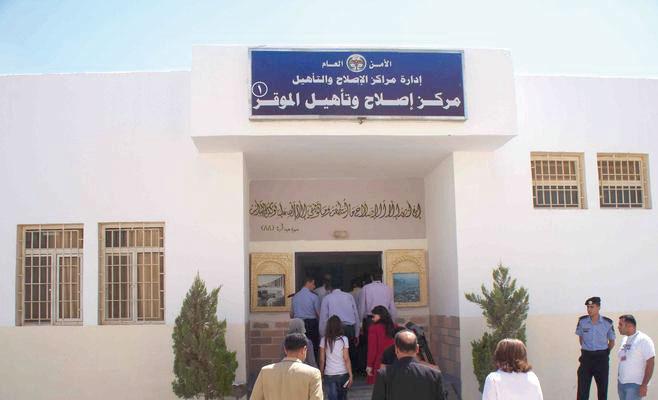You are here
Human rights reports highlight lack of implementation as main barrier to reform
By Jason Ruffin - Sep 18,2018 - Last updated at Sep 18,2018

People are seen at a correctional centre in Muwaqqar, 20km east of Amman. Human rights watchdogs have reported an improvement in prison environment in Jordan (File photo)
AMMAN — Earlier this month the National Centre for Human Rights (NCHR) presented His Majesty King Abdullah with its report on human rights as the country was preparing for the Universal Periodic Review (UPR) in November.
The report cited continued violations and lack of “serious” legislation to tackle the criminalisation of torture, freedom of expression and corruption “rooted in the national culture”. However, the document did mention progress on women’s rights. And recently, a provision requiring children of non-Jordanian fathers to continually live in Jordan for five years in order to acquire an ID card was waved by a Cabinet decision.
The UPR is a process by which the UN Human Rights Council reviews and submits recommendations for all 193 UN members on a four-year basis, according to its website. Human Rights Coordinator for Jordan Basil Tarawneh told The Jordan Times in a recent interview that Jordan “is ready to give the Jordanian UPR to Geneva and discuss it”, adding: “We are going to submit 126 recommendations and rules with details.”
Human Rights Watch (HRW) issued its own review in April, which documented “how the reform [efforts] to make things easier for non-citizens had not been effective in any meaningful way,” according to Adam Coogle, a researcher at the HRW said, who added that “the [entire] point of that report was to go through each of the areas where the government made a reform and show that, unfortunately, based on the evidence, based on the interviewees that there had been some minor, really minor gains here and there, but by and large, peoples’ lives haven’t changed”.
Both the NCHR and HRW reports place a large portion of blame on “loosely” worded legislation that can hinder implementation and cause reform efforts to miss their mark.
Freedom of expression
According to the HRW report, in 2013, Jordan accepted suggestions by the UN Human Rights Council to ease restrictions on freedom of speech and opinion. Despite legislative reforms limiting prosecution in State Security Courts to acts such as terrorism and treason, both reports, (NCHR and HRW’s) cited loopholes and “loosely worded” laws which would allow prosecutors to broadly define what constitutes acts such as terrorism.
For example, in 2014, Jordan amended its 2006 Anti-Terrorism Law to include acts defined as “disturbing [Jordan’s] relations with a foreign state,” according HRW’s report. This is loophole that “basically expanded the law and made it include speech-related crimes, so basically nothing changed on the ground”, coogle explained.
NCHR’s report mentioned similar instances such as an amendment to Article (68/H) of the Civil Service By-law, which added a constraint on employees expressing their opinion by banning acts such as “insulting the country” in social media posts.
Disability rights
Since Jordan’s last UPR, it has made strides for the rights of people with disabilities, according to HRW’s report. The progress came in light of the 2017 Law on the Rights of Persons with Disabilities, which legally solidified the rights of the disabled.
The law called for the “inclusion” of people with disabilities, as well as “reasonable accommodation”. HRW’s report also praised the broad term of “violence” against disabled persons which read in the report: “An action or denial that will deprive a person with a disability of a certain right or freedom.” However, NCHR noted some implementation shortfalls in terms of resources.
Women’s rights
Both HRW and NCHR were generally optimistic in their reports on the issue of women’s rights reforms. Jordan abolished article 308 in 2017 (commonly referred to as the marry your rapist law) and NCHR praised required quotas of women in elected councils. However, Jordan’s nationality law still does not allow women married to non-Jordanians to pass on their citizenship to their husbands and children, while men married to non-Jordanian women enjoy this right, according to HRW.
A reform programme to allow children of non-Jordanian fathers and Jordanian women to apply for an identification card was implemented by the Jordanian government in 2014, but according to an article published in The Jordan Times citing numbers from the Jordanian National Commission for Women, as of February 2018, only around 72,000 of the 355,000 eligible applicants had been issued cards.
The article cited a lack of documentation, high fees and the requirement of five years of continued residency in Jordan, (which has been dropped) as barriers. HRW said this continued to pose obstacles to employment, healthcare and day-to-day life for non-citizens.
Police abuse
According to HRW’s report, Jordan did not accept to ratify a recommendation during its last UPR in 2013 to include the Optional Protocol to the Convention Against Torture and Other Cruel, Inhuman or Degrading Treatment or Punishment. However, it did accept to amend the Penal Code to deter abuses and end impunity, the report stated.
NCHR’s report highlighted that Article 208 of the Penal Code was amended in 2017 to increase the minimum sentence for such crimes from three months to six months, but it said little more was done. NCHR added that it received 85 complaints in 2017 from citizens concerning allegations of torture and mistreatment by law enforcement officers and various security services.
While Coogle said the police force benefited from “a strong chain of command, good operating procedures and relative professionalism”, he added that he expected that complaints went underreported.
“The police justice system tends to serve as a device for impunity rather than an actual meaningful punishment for criminal acts that could really send a message to others that there would be accountability; unfortunately, that does not really exist and people in society know it does not exist, which is why you do not get complaints.”
According to the report, abuse charges are also tried in the Police Court, where two out of three judges are police-appointed officials. The Jordan Times could not find the number of convictions the court has issued related to torture.
However, Tarawneh told The Jordan Times on Monday that “we [currently] have five cases concerning torture. We are interrogating suspects and we will fix it and are currently investigating the matter”.
On Monday, he told the Jordan News Agency, Petra, that the cases were four (See story on page 3).
NCHR is also allowed to monitor prisons in both announced and unannounced visits, and said in 2017 there was improvement in “prison environments”.
Freedom of assembly and arbitrary detention
In the report issued by the NCHR, it noted a number of bans by administrative governors of public gatherings. The HRW also mentioned the amendment of the Public Gatherings Law in 2011 replacing required “formal government permission” with a “notification” sent to the Ministry of Interior.
The NCHR stressed that the bans by administrative governors did not prevent people from staging peaceful protests.
Both the NCHR and the HRW noted an increase in arbitrary detentions and cited the Crime Prevention Law of 1954 as being used to “circumvent defendants’ due process rights”. However, the NCHR said an amendment, in 2017, of legislation related to enhancing fair trial of people deprived of their liberty in the initial investigation phase was a step in the right direction.
Future reforms
Tarawneh told The Jordan Times that since releasing the Comprehensive National Plan for Human Rights in 2016, and establishing the NCHR, “we have been admitting our mistakes, and at the same time, we give solutions for the future. We make the rules for human rights more suitable day after day, year after year”.
Both the NCHR and the HRW highlighted in their reports that reform has to be followed by implementation in order to be effective. “In terms of reform efforts, I thought the King’s initiatives last year were interesting. When he formed the committee to come together and form concrete objectives to reform the justice sector, the thing the committee did was not only issue a document that talked about the things they wanted to achieve,” Coogle said, adding that “they actually published their draft law amendments [so] you could really judge what they were achieving. It provided a real indication or message of what they were doing”.
The government has been transparent in announcing initiatives Coogle and Tarawneh noted, as well as including discussion from both citizens and officials on important issues. However, Coogle suggested that clearer goals and implementation practices would be important for moving forward.
Related Articles
AMMAN — Jordan endorsed 131 recommendations out of 226 made by the UN's Human Rights Council (UNHRC) at the Kingdom's Universal Periodic Rev
AMMAN — Human Rights Watch (HRW) group on Wednesday commended the Jordanian Parliament for approving a series of important human rights refo
AMMAN — Human Rights Watch (HRW) has said that it will open a regional office in Amman in February 2023 in a move to intensify its advocacy
















